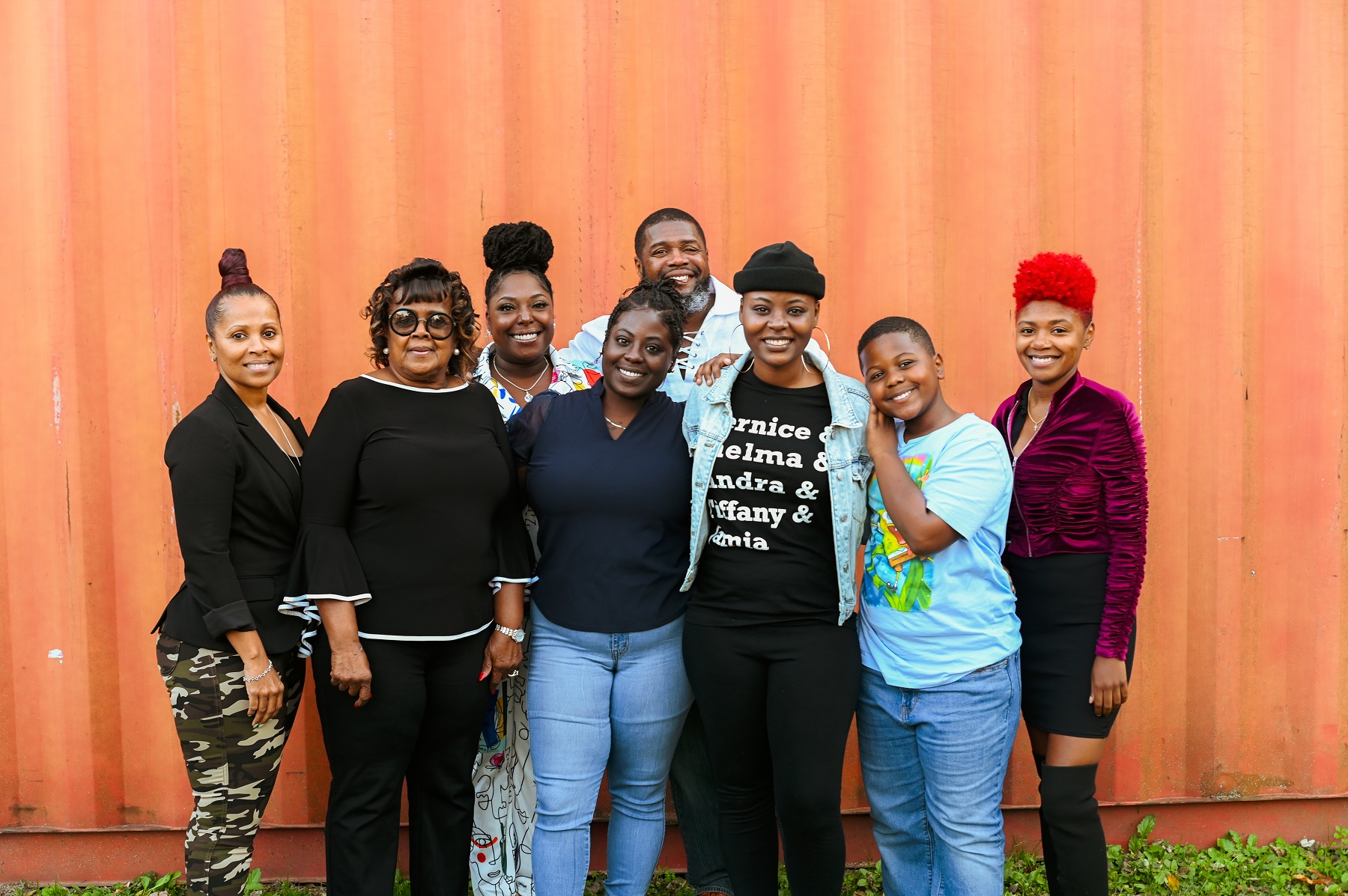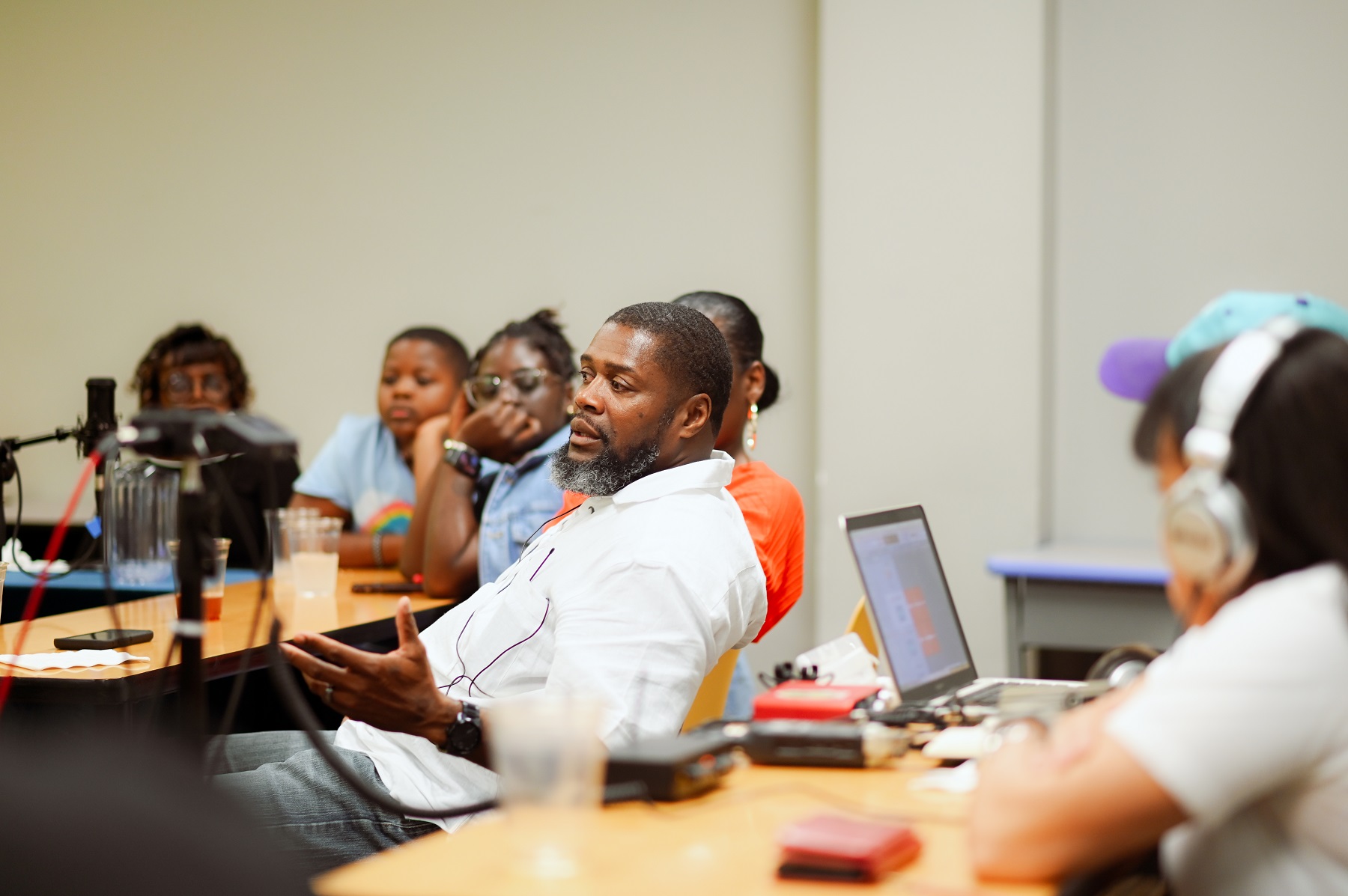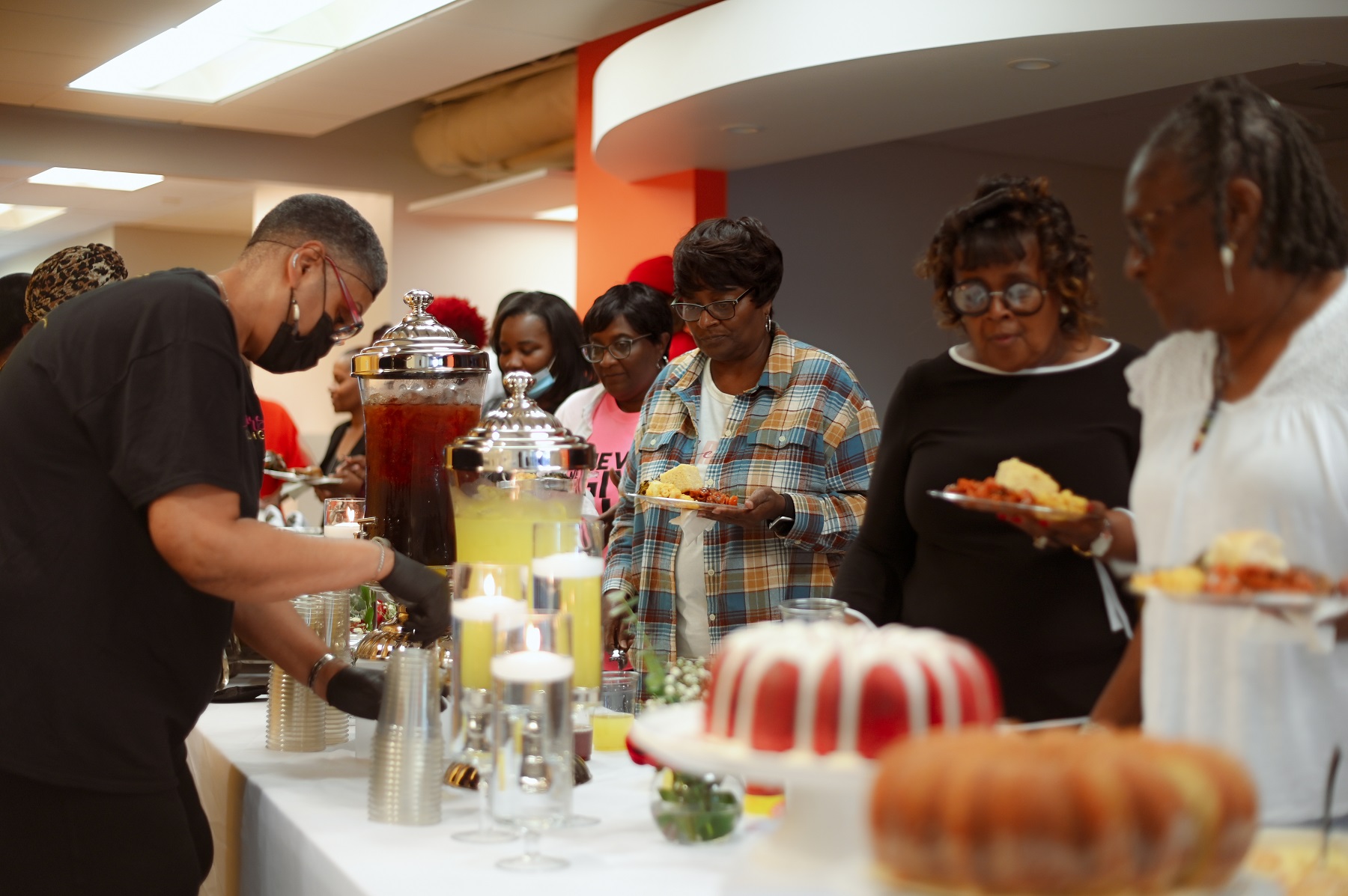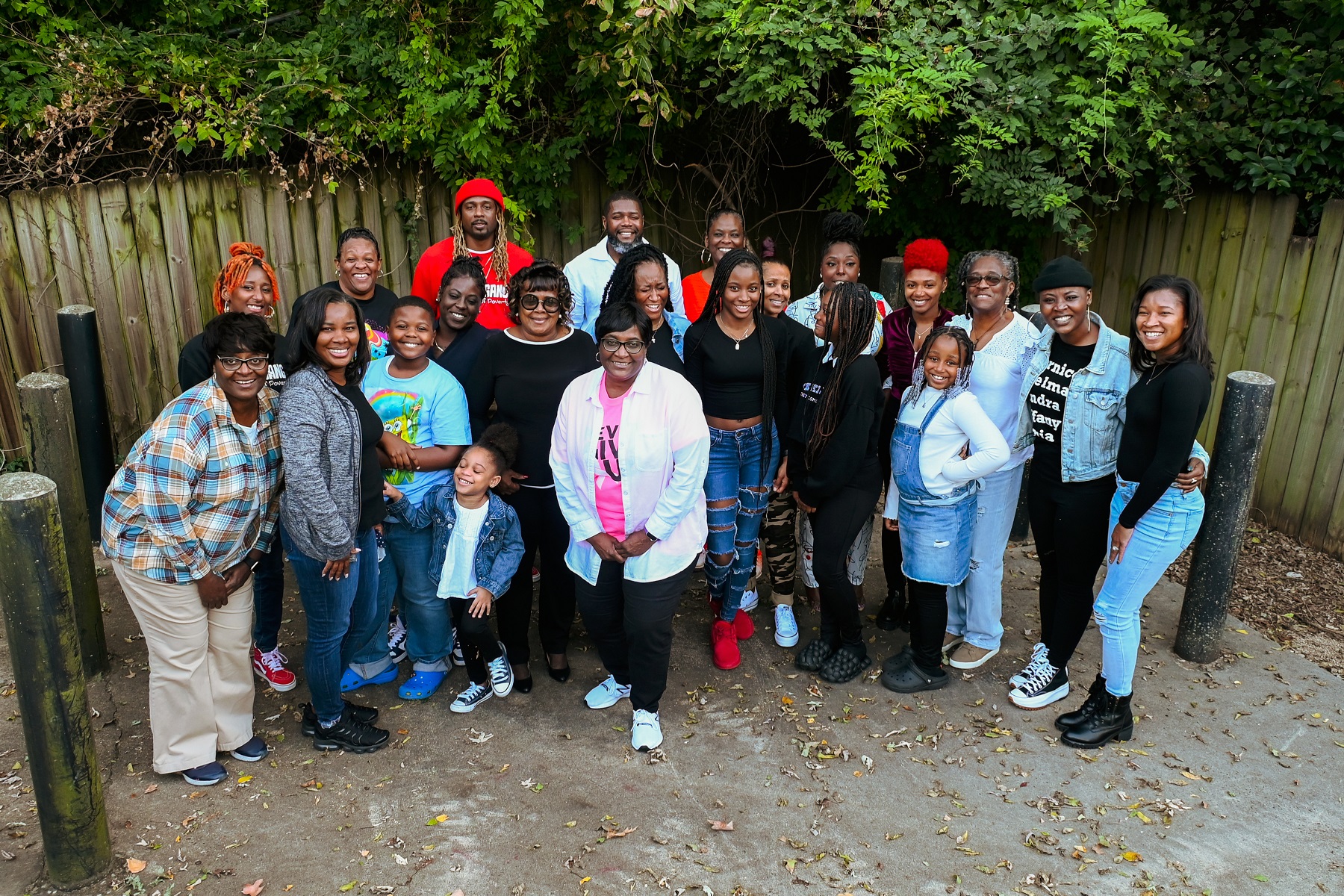With ASC Funding, a Family with Deep Charlotte Roots Shares Its Story with the World

By Page Leggett
In many ways, a family’s history is the story of the place they come from. Our personal narratives are rooted in where we grew up, where our parents grew up, the towns and cities we’re tied to.
Last fall, Hannah Hasan, a poet and storyteller, partnered with Arts+ and freelance media producer, filmmaker, writer (and podcast fan) Colin Harden to tell the story of one family that’s called Charlotte home for five generations. Their story is uniquely theirs. It’s also universal.
As Harden put it, “We took something relatively small and made it as big and beautiful as we possibly could.”
The result of the family reunion Hasan facilitated is “A Seat at the Table,” a six-episode podcast series that launched on Saturday, Feb. 4. Hosted by Hasan and narrated and produced by Harden, the series traces both sides of Mia McClure’s family – the Perrys and the McClures – along with the city (specifically, the Double Oaks and Wilmore neighborhoods) they call home.
Recorded last October during a gathering over a soul food feast prepared by caterer Diedre Blake, the podcast also features contextual conversations with Charlotte artists, leaders and visionaries. McClure’s family’s discussion touches on education, places and landmarks that no longer exist, the Black experience in Charlotte, faith and the value of family.
Sharing stories, seeing each other’s humanity

Arts+ – formerly Community School of the Arts – has been making arts education available to students of all ages, skill levels and socioeconomic backgrounds for 50 years. The nonprofit received a $10,000 ASC Cultural Vision Grant to create this series.
Arts+ helped organize the gathering, handled logistics and, as Caroline Tippette, Arts+ director of visual arts programs, said “got the podcast out into the world.”
“Arts+’s main mission is to provide high-quality, accessible arts education for all ages, regardless of means or background,” she added. “A lot of what we do, beyond that, is community building. This family conversation and podcast are aligned with that mission.”
Hasan has done community storytelling at Arts+ in the past and had wanted to work with them again. “I believe in sharing stories in community,” she said. “All of us experience stories every day. We tell our own stories in the clothes we wear, the foods we eat, the homes we live in. We begin to see each other’s humanity and interconnectedness when we understand each other’s stories.”
Hasan met Mia McClure (Mia Love Live) last year when McClure was featured in Hasan’s theatrical event, “I Am Queen: CHARLOTTE,” which ASC also helped fund.
Soon after, Hasan was looking for a local Black family to feature in the podcast and was hoping to find one that went back in Charlotte for three generations. McClure had traced her family history―on both her maternal and paternal sides―back five generations.
Hasan had found her ideal family. “They’re Charlotte gems,” she said.
“Mia is one of the connecting fibers of her two sides of the family,” Hasan explained. “When they came together, they talked about their lives and their experiences in Charlotte and their memories of good times time and hard times. It was a beautiful conversation. And Colin captured it all.”
Harden, a Charlotte native, was assisted by his mother, Susan Pinckney. “I loved having her there,” he said. “I’m glad she got to see the weight and gravity of it. It’s more than just setting up equipment. You’re listening to people sharing their stories, and it’s really humbling and perspective-shifting.”
Hasan has nothing but praise for her collaborator. “The way Colin loved on this project was incredible,” she said. “It’s as much, if not more, his than mine. Colin’s vision for this podcast was well beyond anything I could have visualized.”
Harden let the major themes of the podcast emerge from the conversation rather than giving it a framework in advance. “We let the family talk and then extracted themes from their conversation,” he said.
Breaking bread together

The gathering happened on the city’s west side at the Arts Factory at West End Studios on West Trade Street. An uncle blessed the food, and photographer Dionna Bright captured the convening of the families.
“Both sides of the family, from children to elders, came,” Hasan said. “Mia’s dad was sick and couldn’t attend, but cousins, aunts and uncles were there. This was such a beautiful group of people―loving, warm and real.”
Hasan led the more than 20 family members through a guided conversation―but she didn’t need to do much, as “there was so much synergy already there,” she said.
The family talked extensively about Rockwell AME Zion Church, where both sides of McClure’s family have worshipped for generations. “The church is wrapped up in their family identity,” Hasan said.
McClure said both sides of her family interact often. Church is one of primary places where that happens.
Education was another topic covered. McClure’s cousin, Sheila Goodson, had been excited to attend the historically Black West Charlotte High, as her mom, older sister and cousins had. But court-ordered bussing was introduced in Charlotte-Mecklenburg Schools in the early 1970s, and Goodson was bussed across town to Independence High School.
An entire episode focuses on racism and includes discussion of personal incidents of racial violence as well as public ones such as the police shooting and killing of Keith Lamont Scott.
It’s in this episode that Harden briefly stepped out of his role as narrator. “I only wanted to insert my opinion one time,” he said. “And that’s when I said we have to be vigilant in our fight against oppression in all its forms.”
The family also talked about gentrification, which is rapidly making both neighborhoods McClure’s family comes from nearly unrecognizable to them.
Unlike many family gatherings in this era of political divisiveness, there was no conflict at this dinner. “They talked about race, religion, politics―all the things we’re told to avoid at family gatherings,” Hasan said. “But they all seemed to respect each other’s right to have their own story.”
McClure said conflict―at least the long-lasting variety―is rare in her family. “For both sides of the family, it’s like, even if you’re in a disagreement, someone’s going to call you and say, ‘Hey, that’s your cousin. Or that’s your brother or your aunt. Whatever you’re arguing about cannot be as important as your relationship.”
As often happens when families get together, McClure’s family members said they needed to connect more frequently.
They reconvened for a second event at the Charlotte Art League on Saturday, Feb. 25 to listen to parts of the podcast and discuss the experience. (This time, McClure’s dad was there.) The event gave Arts+ the opportunity to thank the family for sharing so openly. “It was beautiful to see it come full circle,” Tippette said.
‘The real Charlotte’

Arts+ hopes to produce another podcast in this vein―but with another long-time Charlotte family from a different neighborhood. Tippette encourages other groups to consider something similar.
“I think it’s important for nonprofits and government entities to offer people the chance to be heard,” she said. “Action can result from that. A podcast is just one way to do that in a way that people can access again and again. The idea of providing ‘a seat at the table’ for community members is vital.”
McClure was grateful for the opportunity. “This was a time to share memories of the place we grew love,” she said. “We’re all home-grown. It was really good to honor the place that’s responsible for all of us who are here now and the generations before us.”
And while the family has experienced racism, displacement from their own neighborhoods and other struggles, they’ve stayed here. “One family member talked about moving away and coming back,” Harden said. “When it’s your home, you always want to find a way to get back.”
“I have a little boy who’s due literally next week, and I want him to grow up, make friends and make memories in the place where I grew up.”
“This podcast is a love letter to Charlotte,” Harden added. “You can love Charlotte and be upset as you watch it change and wish it was different. I wasn’t surprised that Mia’s family would anchor themselves here. They’ve been here for generations.”
For Harden, creating this podcast helped him define the next phase of his career. He’s starting a new venture, Hermit House, to do “more narrative-based, audio storytelling – both fiction and nonfiction; audio dramas and docu-style podcasts.”
He loved all the research involved in delving deeper into Charlotte’s history. To prepare, he started by creating a short-form podcast called “Harriet Tubman: Greatest American Hero” that he said people all over the world have listened to. “I did that, in part, to get my voice ready to narrate ‘A Seat at the Table,’” he said.
“It’s about perspective. A lot of my stories have been about Black fatherhood; a lot are about women up against a wall in an unexpected situation. I like unheard, unseen perspectives and mining historical stories that might shock people.”
Hasan added: “A project like this reminds the family of the beauty and even the pain they have experienced. They reconnected, reminisced and reminded each other of the beauty and importance of family. This project helps us see the real Charlotte, from the experiences of the people who have been here and chosen to stay here.”
And why’d the family remain in Charlotte in spite of the struggles? Said Hasan, “They stayed because it’s theirs.”

